Let’s start with a story, a beautiful testament to the power of quality sleep. It’s one of many where a simple, natural approach made all the difference.
When Megha reached out for a consultation for her mother in March 2020, I could see the years of struggle in her eyes. Her mother had been dealing with a range of health issues that seemed to have no end. After just 25 minutes together, I shared simple advice: focus on quality sleep.
Megha was skeptical—how could sleep, something so basic, hold the solution to such complex problems? But I assured her, “I don’t need your mother on a program. I just need her to sleep.” I gave a few practical tips, asking them to try these changes for 15 days.
To their amazement, within two weeks, her mother’s acid levels, bone pain, anxiety, and even blood sugar and blood pressure were in check. Her doctor was even able to take her off certain medications. It was a transformation they had longed for but never imagined could happen so simply. And in a world where it’s easy to prescribe expensive programs, all it took was sleep.
So, why sleep? You might ask.
Because it is one of the most under-utilized, powerful, and natural drugs with zero side effects and a macro holistic healing effect, use it well.
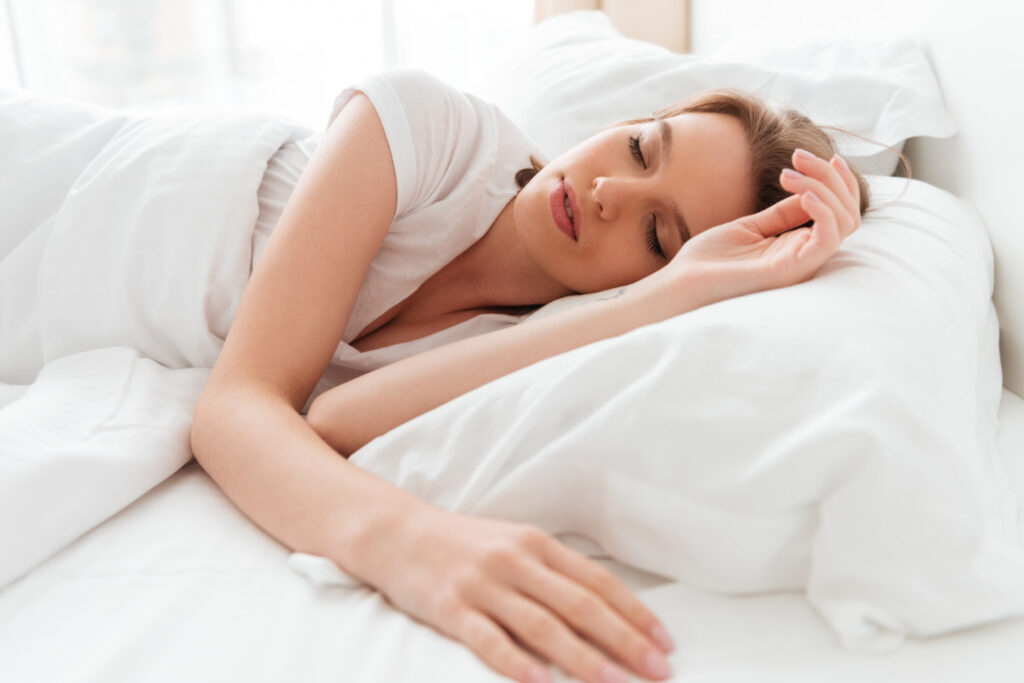
In today’s hectic world, reaching this state often feels challenging. While modern companies offer technology that optimizes temperature to support restful sleep, many are beginning to wonder: Can we combine this tech with age-old natural techniques for an even better night’s rest?
The answer lies in balancing high-tech solutions with time-tested, natural practices for a restful, rejuvenating experience. Time to explore more!
Table of Contents
ToggleFirst, let’s understand the role of sleep in our health.
Sleep is more than just rest; it’s a restorative process that supports cellular repair, emotional processing, and cognitive functioning. During sleep, our body undergoes several critical functions, such as tissue growth, memory consolidation, and immune system training. These functions are essential for overall health and well-being, particularly for cellular health.
Each night, our body cycles through two types of sleep:
- NREM Sleep (Non-Rapid Eye Movement): This constitutes about 75-80% of our sleep and includes three stages (N1, N2, and N3). N1 marks the transition from wakefulness to sleep, N2 is a deeper stage with sleep spindles that aid memory, and N3 is deep sleep where body repair and growth occur.
- REM Sleep (Rapid Eye Movement): Making up the remaining 20-25% of sleep, REM is characterized by rapid eye movements, vivid dreams, and significant brain activity. This stage aids emotional regulation, memory integration, and hormonal balance.
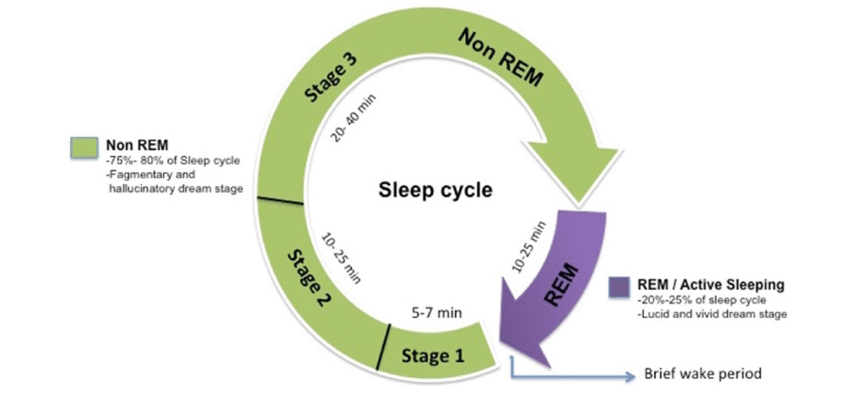
Together, these cycles create a complete experience crucial for mental, physical, and cellular health. The circadian rhythm, our body’s internal clock, regulates these cycles and ensures proper synchronization of bodily processes.
- Melatonin, often referred to as the sleep hormone, is naturally produced by the pineal gland in response to darkness and plays a key role in regulating this rhythm. It signals our cells and organs to align with daily light and dark cycles.
Supporting this rhythm and maintaining balanced sleep stages allow for optimal cellular function, energy levels, and longevity.
If you’re eager to explore how the circadian rhythm works and its health benefits, enroll in our online course to learn more about optimizing your rest.
But disruptions like inconsistent lighting, poor bedroom environments, stress, or bad lifestyle habits affect this cycle, leading to fragmented or insufficient sleep. To counteract this, sleep tech now uses a blend of scientific understanding and high-tech solutions.
What are these modern sleep technologies?
1) Smart mattresses and beds: One of the most advanced and popular technologies available today is the smart mattress leading the charge.
- Smart mattresses analyze various factors, such as heart rate, body temperature, and movement, to determine optimal sleep conditions.
Another company uses a technology to track heart rate variability (HRV) and adjust firmness. These adjustable mattresses are paired with data-tracking apps that inform users about their sleep quality and offer improvement tips.
2) Sleep trackers and smart rings: Wearables go beyond simply tracking sleep duration; they monitor sleep stages, HRV, and even breathing patterns. With insights into sleep stages (light, deep, and REM), these devices give users a clear picture of what’s happening while they sleep and how they can improve it.
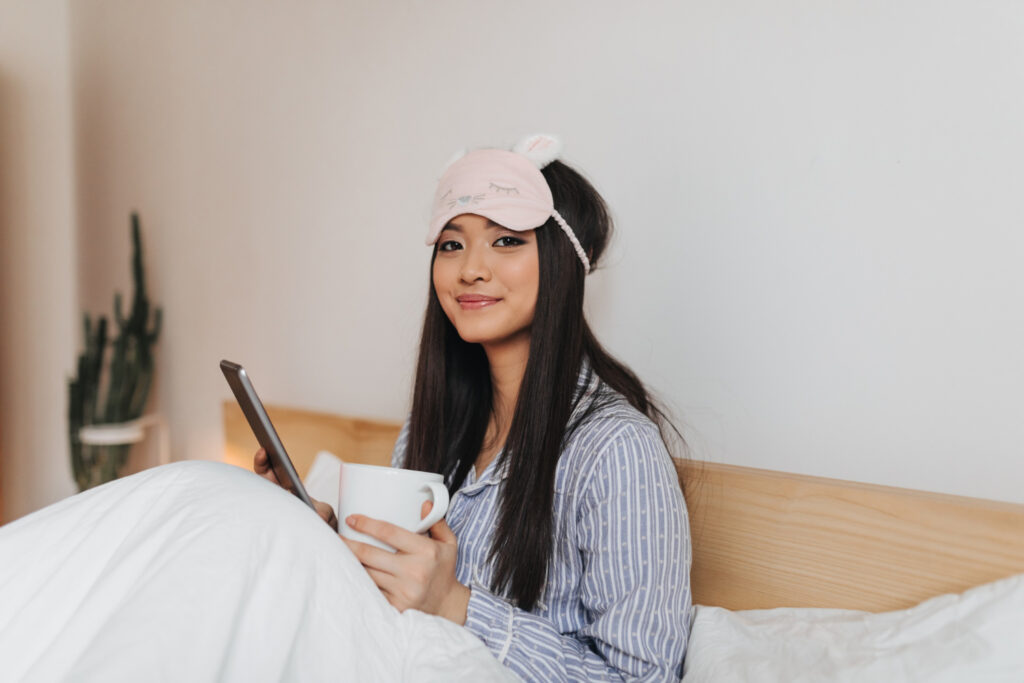
3) Advanced lighting solutions: Light exposure directly impacts our circadian rhythms, the internal clock that tells our bodies when to feel awake and when to feel sleepy. Many such devices designed to mimic natural sunlight cycles are helping people wake up naturally and fall asleep more easily.
- Moreover, blue light filters on devices like smartphones and laptops help reduce blue light exposure before bedtime. Night shift mode or blue light-blocking glasses have been shown to mitigate the adverse effects of blue light on melatonin production, making it easier to fall asleep even when evening screen time is unavoidable.
4) Soundscapes and noise-canceling tech: Sound is another factor that can significantly impact sleep quality. White noise machines or sound therapy devices create calming, steady sounds that can mask background noise, which helps reduce disruptions from sudden noises like traffic or loud neighbors.
- Then, there are wireless earbuds, which use noise-masking technology specifically designed for sleep, are another example. These don’t stream music but rather play a pre-set selection of soothing sounds designed to mask background noise without disturbing the user’s sleep cycle.
5) Sleep hygiene apps and mindfulness tools: In addition to physical devices, a wide range of apps are dedicated to improving sleep hygiene. These apps offer guided meditation, stories, and relaxing music aimed at reducing stress and anxiety, both known to interfere with sleep.
While these devices can be beneficial, relying solely on technology may disrupt our natural rhythms. Combining technology with natural sleep practices can create a balanced approach that maximizes the benefits of both worlds.
Natural Quality Sleep Solutions
1 in 4 people I consult with is chronically sleep-deprived! However, a few solutions have worked wonders for my clients who struggled.
I call this biohacking your sleep!
But what exactly is biohacking? It’s all about DIY Biology—the art of optimizing your body’s biological functions for peak performance, resilience, and longevity.
Importance of Biohacking:
- Bio-individuality or personalized health optimization: Acknowledges individual uniqueness; what works for one may not work for another.
- Preventive wellness: Emphasizes prevention over reaction to health issues.
- Longevity and anti-aging: Aims to improve health span, not just extend lifespan.
Discover the true meaning of biohacking with Australia’s #1 biohacker and naturopath, Lucas Aoun, in one of my most insightful podcast episodes.
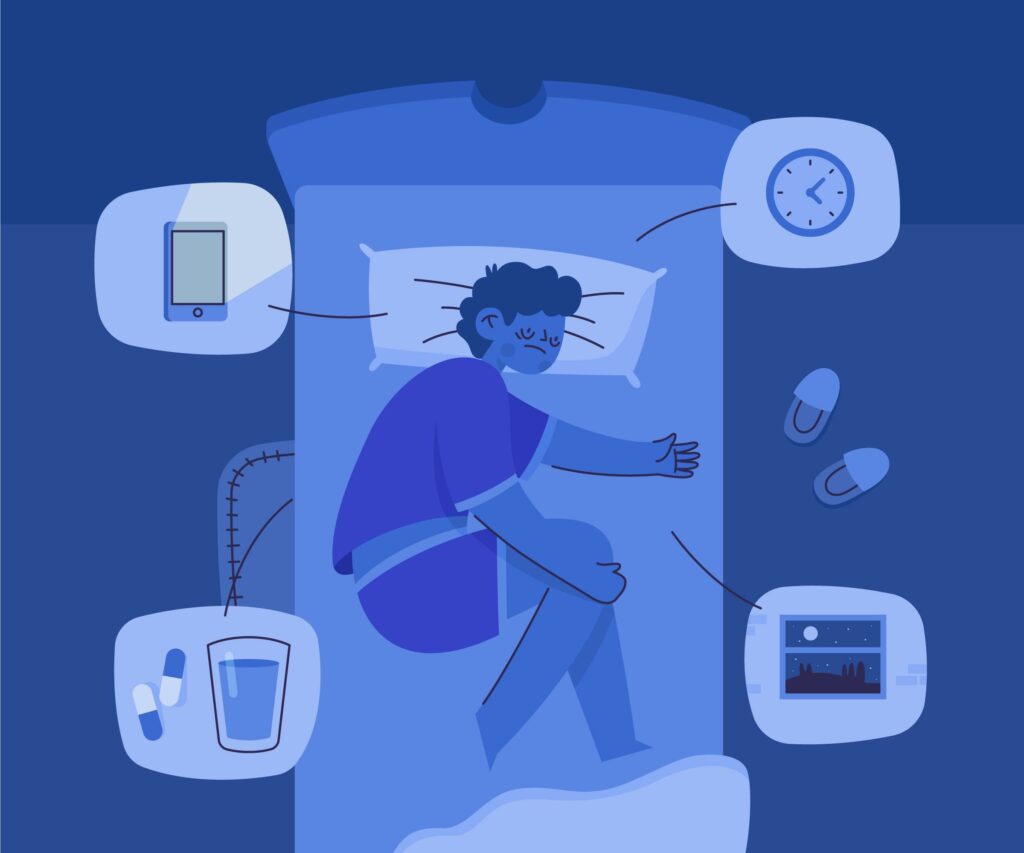
Here are a few tried and tested hacks for restful nights:
- Sleep-inducing vagus nerve technique: Activating the vagus nerve—a nerve that runs from the brainstem to the abdomen and influences relaxation—can be an effective way to fall asleep more easily. By lightly massaging the area at the base of the neck or using deep breathing, you can trigger the parasympathetic nervous system (rest and digest mode), which promotes relaxation and a deep sense of calm.
- Reset your circadian rhythm with natural light exposure: Sunlight exposure during the day plays a crucial role in aligning your internal body clock, promoting wakefulness and alertness. In the morning, try to spend at least 15-30 minutes outside.
- Keep your room pitch-dark: Light, even from small electronic devices, can disrupt melatonin production. Invest in blackout curtains or wear an eye mask to create a completely dark environment that allows melatonin levels to rise naturally.
- Sleeping naked to support optimal body temperature: Sleeping without clothes can help maintain a lower core body temperature. Plus, it has been shown to improve blood circulation, which can help with muscle repair and relaxation.
Cellular Nutrition:
- Consuming a variety of nutrient-dense foods supports cellular health and promotes optimal functioning.
- Focus on whole, minimally processed foods that provide essential vitamins and minerals.
- Reduce intake of caffeine and alcohol, especially in the hours leading up to bedtime.
- Complex carbohydrates (e.g., whole grains, oats, and brown rice) to enhance serotonin levels.
- Dairy products (e.g., cheese, low-fat yogurt) that contain calcium, tryptophan, and magnesium for muscle relaxation.
- Selenium-rich foods, including whole grains and nuts, are linked to longer sleep duration.
- Chlorophyll-rich vegetables like wheatgrass, moringa, barley grass, and celery, contain a component called opium which acts as a natural sleeping aid. Consuming them during the daytime is more beneficial than consuming them during bedtime.
- Nutmeg is a natural sleep spice from Indian Wisdom. Pinch of nutmeg with water OR dash of nutmeg + 1 tbsp of fennel + pinch of cinnamon – boil in water and consume 30 mins before bedtime. However, too much nutmeg can make you high and acidic.
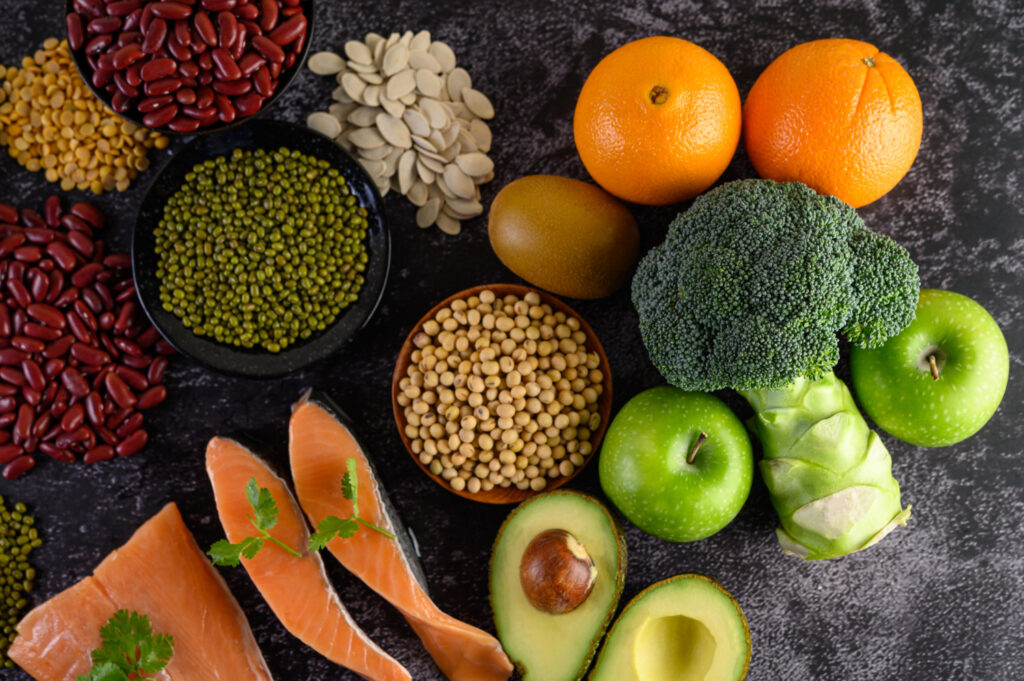
Superfoods rich in Melatonin:
- Eggs
- Fish
- Mushrooms
- Cereals
- Germinated legumes or seeds
- Cherries, strawberries and kiwis
- Black pepper
- Wolfberry (goji)
- White radish
- White mustard
- Black mustard
- Curcuma
- Fenugreek
- Almond
- Sunflower
- Peppers
- Tomatoes
- Potatoes
- Rice
- Bean
- Barley
Supplements and natural remedies:
- Chamomile tea: Chamomile tea has been used for centuries as a natural remedy for insomnia and relaxation. Chamomile contains apigenin, an antioxidant that binds to specific receptors in your brain, potentially reducing anxiety and promoting sleep.
- Tryptophan supplements (under expert guidance): Tryptophan, an amino acid that converts into serotonin and eventually melatonin, may support better sleep quality. Available in foods like turkey, dairy, and oats, tryptophan supplements can be effective when used with professional guidance to avoid unwanted side effects.
- Melatonin supplements (under expert guidance): Melatonin supplements can help people struggling with circadian rhythm disorders or jet lag. However, since excessive use can disrupt the body’s natural melatonin production, it’s best used under the guidance of a healthcare professional.
- Crushed poppy seeds tea (in areas where legal): Poppy seeds contain small amounts of alkaloids that can induce relaxation and support a calm, restful state. Brewed into a tea, it’s a natural way to unwind; however, always check legality and consult a healthcare provider to ensure safety.
Physical activity:
- Engage in at least 30 minutes of moderate exercise daily.
- Studies indicate that active adults sleep an average of 15 minutes longer than those who do not exercise.
- Aerobic exercises (e.g., cycling, swimming, running) enhance cardiovascular health and contribute to better sleep.
- Strength training to promote muscle building and metabolic balance.
- Mind-body exercises, such as yoga and tai chi, reduce stress and enhance restful nights.
- Yoga asanas like Shirsanana, Sarvangasana, Uttanasana, Viparita Karani, and Paschimottanasana are helpful for someone having insomnia. Yoga Nidra and Savasana are quite beneficial when done during bedtime.
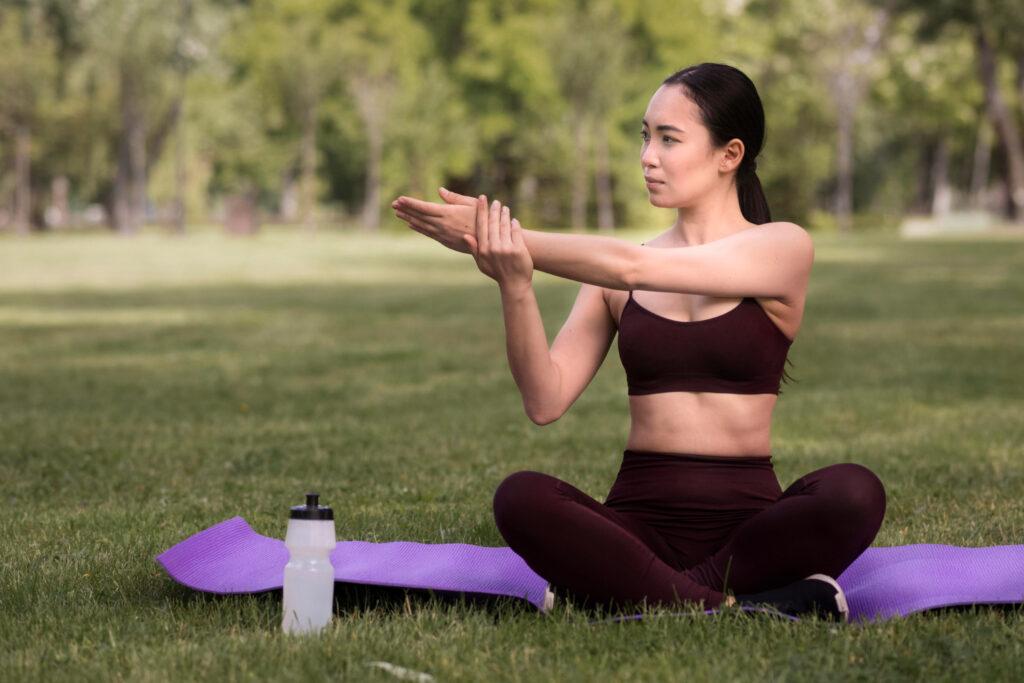
Breathwork for relaxation:
Breathing exercises are invaluable for preparing the body and mind for sleep. Here are some of the most effective ones:
- 4-7-8 breathing: A popular method for relaxation, the 4-7-8 technique involves inhaling for 4 counts, holding for 7, and exhaling for 8. It’s effective in slowing down the mind and body.
- 6-6-12 breathing technique: Inhale for 6 seconds, hold for 6 seconds, and exhale for 12 seconds to calm the nervous system.
- Pranayama practices: Traditional practices like Pranayama breathing are proven to increase relaxation. Anulom Vilom, Bhramari (Bee Breathing), and Left Nostril Breathing (Chandra Bhedana Pranayama) can calm the nervous system, lower blood pressure, and create a sense of peace—ideal for winding down at night.
Emotional well-being & stress management:
- Slump, dump, pump technique: Slump, dump out negativity, and pump in positivity for an instant mood boost!
- Practice meditation, acceptance, letting go, and forgiveness
- Turn to prayer/spiritual path
- Get a hobby
- Surround yourself with good friends or spend time with your family and kids
- Spend time in nature
- Breathing techniques/Pranayama
- Yoga
- Invest in personal growth
Now that you’ve come this far, here are some BONUS TIPS:
- Set a bedtime routine: Keep a consistent bed time, especially between 9-11 pm, to align with your natural rhythm and support heart health.
- Avoid late meals: Have early dinners, ideally by sunset, to improve sleep and digestion. Late meals can leave you feeling heavy and sluggish by morning, as digestion slows after dark.
- Ditch the snooze: Hitting snooze disrupts deep and REM sleep, leaving you tired—wake up with soothing sounds for a refreshing start.
- Limit naps: Frequent naps can signal poor nighttime rest and may raise risks of high blood pressure and stroke; keep them brief or avoid them if possible.
- Avoid gadgets before bed: Blue light suppresses melatonin, keeping you awake; switch off screens an hour before bed for a restful night.
- Get out of bed if awake: Lying in bed awake can train your brain for insomnia; try screen-free activities like reading or deep breathing.
- Skip stimulants: Caffeine up to six hours before bed can disrupt sleep cycles, so consider your intake and opt for calming teas instead.
- Avoid sleep debt: Regular late nights can create sleep debt that takes days to recover from. So prioritize consistent rest for peak brain health.
- Try warm showers: Take a warm shower before bedtime to relax your muscles. You can even add essential oils or Epsom salt to the water.
- Journal and make to-do lists: Take time to journal and release any pent-up stress, and create a to-do list to offload tomorrow’s worries, allowing your mind to rest.
For lasting results, consistency is key. Aim to practice daily, especially when starting, to establish a habit.
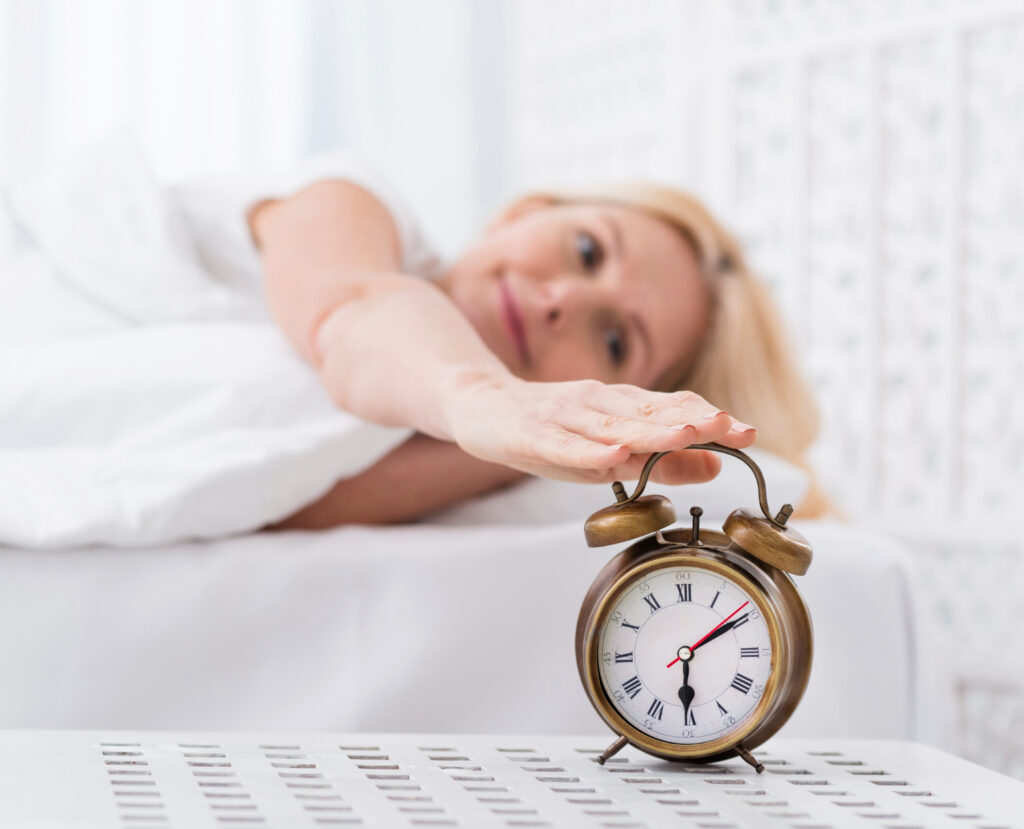
Find a balanced approach that works for YOU!
Achieving quality sleep is about balance. Both modern technology and natural practices can support restful sleep, and the best results often come from using them together.
With a balanced approach, quality sleep becomes a daily ritual that strengthens resilience, boosts cellular health, and leaves you feeling rejuvenated every day!
Struggling to get quality sleep or feel truly refreshed each morning?
Set up a one-on-one consultation with our integrative team to guide you with personalized solutions tailored to optimize your sleep, restore your energy, and boost cellular health.
Reach out to us at 1800 102 0253 or write to us at [email protected].
Disclaimer: The information provided in this blog is for educational purposes only and is not intended to be a substitute for professional medical advice, diagnosis, or treatment. Always seek the advice of your physician or a qualified healthcare provider regarding any questions you may have about a medical condition or before starting any new treatment, including supplements, breathing exercises, or sleep technology.
Team Luke
Our team of registered dietitians, certified nutritionists, lifestyle coaches, medical practitioners, and holistic health experts come together to share practical, accessible insights for your well-being. Whether you're seeking tips on preventive health, managing a specific condition, or simply looking to live a more balanced life, you’ll find a wealth of easy-to-apply knowledge here.
Start Your Wellness Journey
Feeling inspired to take the next step in your wellness journey? Connect with us to explore how our tailored programs can support your health journey. Your transformation is just a conversation away.



